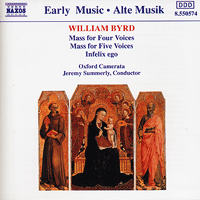The early 1580s marked an important change in the sacred music of William Byrd, just as they did in the history of Catholicism in England. Many of the Latin motets of the 1580s, collected in two volumes of Cantiones sacrae, set words about the Babylonian Exile, charged with penitential ecstasy. These are non-liturgical works - indeed the text of Infelix ego draws on the Bible only indirectly through the pen of savonarola. The words, written as that Catholic puritan demagogue awaited execution in Florence, reflect on his own personal guilt and the redemptive pity of God. They stimulate Byrd's wide technical resources, from two- and three-part writing to complex six-part polyphony to dramatic homophony, the whole reminiscent of the vast Marian antiphons of Christopher Tye or William Mundy. By contrast, the Mass settings are compact and controlled. They belong to a later period, when Byrd's response to his circumstances had changed from the impassioned to the practical; the Gradualia represent an attempt to set music for the entire Catholic liturgy, and the Masses may have been linked to the same project. |


